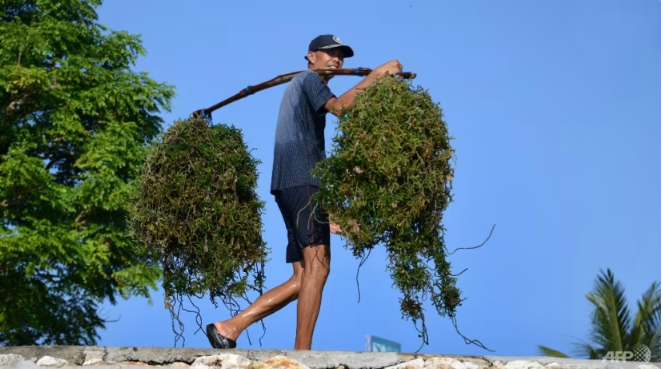November 26, 2025 | 21:01 GMT +7
November 26, 2025 | 21:01 GMT +7
Hotline: 0913.378.918
November 26, 2025 | 21:01 GMT +7
Hotline: 0913.378.918

A seaweed farmer carries a load from a harvest at Nusa Beach on Indonesia's resort island of Bali on Mar 18, 2021. Photo: AFP/Sonny Tumbelaka.
Speaking at a business conference, Jokowi, as the president is known, said he will implement downstream policy for other commodities after successfully implementing it on mineral resources.
Resource-rich Indonesia banned exports of nickel ore to favour domestic processing in 2020, which attracted billions of dollars in investments into smelters to produce metals, and facilities to extract the materials used in electric vehicle batteries.
He said the downstream policy will also be implemented on agriculture products such as seaweed, which the archipelago country is the world's second-largest producer of.
"Not only for pharmaceutical and cosmetics, (seaweed) can also be used to produce bioethanol," Jokowi said.
Indonesia's seaweed output this year is estimated at 10.2 million metric tons, he said, and most are exported raw.
Bioethanol is typically produced from sugar molasses but certain types of seaweed have been promoted as alternative feedstock to produce the renewable fuel.
Indonesia is seeking to increase its bioethanol production capacity as it aims to expand the portion of renewable fuel in its energy consumption.
It mandates the use a biodiesel called B35, which contains 35 per cent fuel made from palm oil, but has not mandated the use of a bioethanol mix in gasoline due to the limited supply of sugar.
Authorities have also suggested using cassava as a potential source of bioethanol.
(Reuters)

(VAN) A new study reveals how the simultaneous effects of ocean acidification, salinity and loss of oxygen are making the world more fragile.

(VAN) Hopes are growing that the creation of the first 3D turkey gut model could be a turning point in the battle against the virulent blackhead disease.

(VAN) Tyson, America’s biggest meat supplier, plans to shutter one of its largest beef processing plants as the industry continues to struggle with low cattle supplies and political pressure from Washington.

(VAN) New FAO study shows how digital solutions are empowering farmers and fishers to prevent losses and build resilient agrifood systems.

(VAN) Brazil's COP30 presidency pushed through a compromise climate deal on Saturday that would boost finance for poor nations coping with global warming but that omitted any mention of the fossil fuels driving it.

(VAN) Poultry farmers in the UK have been warned that they could face one of the worst winters yet for bird flu.

(VAN) Prices of main-crop paddy have risen sharply, with jasmine rice hitting 16,100 baht per tonne — the highest level in years.